关于游戏开发者生活质量的调查结果
作者:Patrick Miller
“游戏开发者们:你们过得好吗?”
这是我们在2012年底针对1000名开发者提出的问题。我们清楚冗长的工作时间,频频裁员,加上突击赶工,游戏行业真是一个难熬的地方。我们认为除了每年4月发布的薪水调查之外,还需要补充一个生活质量调查,以便了解若不单纯以收入来衡量,开发者的生存情况究竟如何。
你对自己的薪水满意吗?你是否看好当前着手的项目?你愿意在今后5年都待在这个行业吗?请查看同行们所作的以下回答。
人口统计资料和方法
我们总共收集了1051份网络受访者的调查结果(起始时间是2012年12月至2013年1月)。这份调查问卷包括40道多项选择题,参与者可以选择回答仅与自身情况有关的问题。这些受访者的人口统计资料如下:
年龄:4%受访者年龄不超过21岁,69%介于22-34岁,23%介于35-44岁,4%介于45-54岁。
经验:9%受访者游戏开发经验不满一年,16%拥有1-2年工作经验,32%工作经验为3-6年,18%拥有7-10年工作经验,14%则是11-15年,7%拥有16-20年工作经验。
管理层:46%受访者属于管理层,54%处于非管理层。
地理位置:半数以上受访者自称位居北美(将近50%位于美国,13%位于加拿大),将近16%位于欧洲,其余基本上均衡分布于亚洲、澳大利亚、新西兰、中美和南美。
学科:45%受访者称自己的主要工作任务是编程,21%是设计,13%是制作,12%是美术,5%是QA,2%是音频。其余则多属于兼顾多项技能的独立开发者。有趣的是,开发学科与调查结果并无紧密关系。
工作室规模和大小:7%受访者属于个人独立开发者,19%来自2-5%人的小型团队,14%来自6-10人团队,18%属于11-30人团队,9%来自31-50人团队,7%来自51-80团队,5%来自81-100人团队,8%来自101-150人团队,4.5%来自151-200人团队,5.5%来自201-300人团队,3%来自300人以上的团队。36%受访者将自己的工作室称为“小型独立开发商”,25%属于“已成型的独立开发商”,25%属于“发行商所有开发商”,14%属于“第一方开发商”。
游戏平台:46%受访者开发盒装主机/PC游戏,36%开发可下载游戏,20%开发社交游戏,17%开发网页游戏,35%开发移动游戏(平板电脑/智能手机),10%开发掌上主机游戏。
工作和职业满意度
典型日程安排
17%受访者一般每周工作时间少于40小时,58%工作介于40-50小时,16%工作51-60%小时,5%工作61-70小时,1.5%工作71-80小时,0.75%工作超过80小时。87%加拿大开发者在常规开发过程中每周工作时间少于50小时,同一工作强度的英国开发者占比79%,美国和加拿大开发者占比72%。
83%开发者有灵活的工作日程,17%则是固定工作日程。固定工作日程的开发者对工作满意度更高;有36%受访者对自己的工作不太满意,而灵活工作日程的开发者满意度仅为14.5%。
57.8%开发者可以选择在家工作,这一群体的工作满意度也普遍较高:75%可在家办公的开发者对工作感到满意,不可在家上班的开发者工作满意度则是61%。在这些满意的受访者中,可在家办公者对工作感到“非常满意”的比例比不可在家办公者高两倍左右。
周末或节假日加班已经成为家常便饭:22%受访者经常如此,31%偶尔如此,36%很少如此,11%从未在此期间加班。有趣的是,周末和节假日加班并未影响开发者的工作满意度。
总体来说,开发者的一般日常工作对一个人的社交生活和家庭生活略有消极影响,3%认为有非常积极的影响,21%认为有点积极影响,32%认为毫无影响,37%认为有点消极影响,7%认为极具消极影响。
薪资福利
在报酬这一方面来看,13%开发者认为自己得到了很好的报酬,35%认为得到相当的报酬,25%认为一般,19%认为报酬较低,8%认为非常之低。毫无疑问,薪资水平与工作满意度的联系甚为紧密。
42%开发者得到的是版税或基于销售额的红利。没有得到红利或版税的开发者自称对工作感到满意的比例比前者低20%,61%没有版税或红利的开发者对工作感到有点满意或者非常满意,而拥有版税/红利的开发者工作满意度则高达81%。
从福利来看,27%受访者对自己的福利感到非常满意,29%感到有点满意,24%觉得一般,10%有点不满意,10%非常不满意。福利待遇也与总体工作满意度直接相关:85%对福利满意的开发者对工作满意度也相对较高,对福利“有点满意”的开发者工作满意度为74%,认为福利“一般”的开发者工作满意度为64%,对福利“有点不满”的开发者工作满意度为47%,对福利“非常不满”的开发者工作满意度为41%。
积极性和预知影响
多数开发者认为自己的能力对项目带来了重要影响:40%认为自己的能力非常重要,35%认为有点重要,15%认为一般,6%认为不是很重要,4%认为非常不重要。有趣的是,拥有3-6年工作经验的开发者对自身能力的评价“有点低”或者“非常低”的比例比其他群体高两倍。
从评估一个人在公司的发展前景来看,多数开发者持有乐观态度:16%认为自己的发展前景非常好,26%认为很好,33%认为一般,15%认为不好,11%认为非常不好。年届34岁以上的开发者的职业发展前景呈现降减趋势:有47%认为发展前景“非常好”和“很好”的受访者年龄介于22-34岁,而35-44岁开发者的这一比例仅为29%,45-54岁开发者这一比例为24%,这反映了开发者需要不断提升自己的技能,否则迈进30多岁的门槛之后就会遇到事业上的瓶颈。
开发者对自己当前的项目普遍表示乐观 :30%认为自己的积极性极高,34%感觉有点干劲,19%认为一般,12%认为较低,6%非常之低。积极性与工作满意度联系紧密,65%对工作满意的开发者对项目干劲十足,60%工作满意度不高的开发者则比较缺乏积极性。
我们倾向于认为这是一种双向的联系:更高的工作满意度意味着更高的积极性,更高的项目热情会生产更高的工作满意度。此外,70%开发者反映当前所从事的项目与自己所喜欢的游戏类型有关,在这一群体中,75%受访者表现出积极的工作满意度(而在认为当前从事项目与自己所喜欢游戏类型无关的受访者中,仅有55%表现出较高的工作满意度)。换句话说,工作室最好招聘那些原来就已经对自己从事项目感兴趣的开发者。
雇主和职业满意度
23%开发者认为当前项目发布后就会面临裁员。这种裁员预期与工作满意意联系甚为紧密。而没有裁员预期的开发者工作满意度则是前者的两倍左右。但实际的解雇率并没有预期裁员率那么悲观,我们在2011年开发者的薪资调查已显示,行业实际裁员率为13%。
开发者对当前公司的未来看法划分为两个阵营:仅有55%开发者表示在未来5年仍将效力于当前公司,在那些愿意留下的开发者中,有90%的工作满意度相对较高,在愿意留下的开发者中,仅有3%表现出较消极的工作满意度,这表明开发者对工作不满意就会离职。
针对开发者在行业中的未来,89%受访者希望在未来5年继续留在游戏行业,但这些开发者多属于年轻群体,92%未满35岁的开发者有此意向,而35及以上年龄的开发者的这一比例仅为83%。针对是否将推荐亲友进入游戏行业这一问题,62%开发者持肯定回答。
赶工期
赶工强度与持续时间
受访者的赶工期长度有所不同,7%称该时期长度少于一周40小时,25%一周工作40-50小时,27%工作51-60小时,20%工作61-70小时,12%工作71-80小时,10%工作80多个小时。
这种工作安排很少超过4个月,29%称赶工期持续时间少于一个月,30%为1-2个月,23%则是3-4个月,7%为5-6个月,3%为7-8个月,2%为11-12个月,3%一年(游戏邦注:这让人疑惑为何长达一年的赶工期也会被视为工作常态)。
我们发现赶工期也足以削弱工作满意度,但赶工期的持续时间却并不影响这个因素。有趣的是,38%每周工作时间通常不到40小时,以及32%经常每周工作时间为41-50小时的开发者,并不认为自己的赶工期的工作时彰所增长,而每周工作51-60小时的开发者中,有25%有此看法,每周工作61-70小时的开发者中,7%有此看法。
从根本上说,你固定工作时间越长,就越有可能在赶工期延时加班。此外,针对各种游戏类型的赶工期比例相同,无论是主机游戏还是社交游戏,都很可能遇到赶工期;地理位置与赶工期的持续时间和工作强度关系不大。
赶工期的影响
在赶工期是否影响开发者的社交和家庭生活这个问题上,1%开发者认为极有积极影 响,4%认为有点积极影响,17%认为没有影响,50%认为有点消极影响,28%认为极具消极影响。从总体上说,如果赶工期每周工作时长超过50小时,开 发者就会开始觉得加班对自己的社交/家庭生活产生了消极影响。
赶工期对开发者的身体健康也带来了普遍影响,9%认为具有很大影响,33%认为影响适度,40%认为极小影响,18%认为毫无影响。
管理层
对管理层的信心
26%开发者对当前项目管理层非常有信心,32%有点信心,16%认为一般,16%有点不确定,10%非常不确定(游戏邦注:需要指出的是,仅有不足半数的调查样本认为自己属于管理层,因此要注意,属于管理层的受访者表示有信心的比例相对高15%)。有91%对管理层非常有信心的受访者同样表现出较积极的工作满意度,所以这也是一个影响留存率和士气的重要因素。
管理层满意度
管理层对自己的工作满意度比一般开发者高两倍,也更可能在家办公(管理层在家办公比例为56%,而非管理层则仅为29%),对产品也更有信心(75%,非管理层则是61%),认为日常开发工作对家庭/社交生活产生消极影响的比例也相对更少。25%管理层每天在家时间超过12小时,而非管理层的这一比例仅为14%。
总体上看,位居管理层的情况相对更好,但他们也更可能在周末和节假日加班(59%,非管理层为41%)。仅有30%管理层从未在周末或节假日加班,所以如果你想身居高位,那就得付得代价。
产品表现和质量
游戏质量
多数开发者对当前项目较为乐观,31%表示非常有信心,36%表示有点信心,16%认为一般,11%表示不确定,6%非常不确定。88%对自己的游戏质量有信心的开发者,对工作满意度也相对较高。
市场表现和评价
提到开发者对上一个项目在市场中的表现是否成功,多数人的看法不太乐观:25%认为上个项目极为成功,31%认为有点成功,23%认为一般,13%认为不怎么成功,8%认为非常不成功。
但针对媒体评价时,28%认为他们的上个项目极受好评,37%认为评价相当好,25%认为一般,8%认为相当糟糕,2%认为极为糟糕。
颇令人意外的是,外界评价及市场表现联系相对较为密切。这有可能是因为媒体评价准确地反映了产品质量(并使用了与大众购买游戏相同的判断标准),或者是因为他们的评价对销量产生了强烈影响,也可能两种因素都有。
工作量与成功的关系
每周工作51-60小时的开发者最可能认为自己上一个项目取得了市场成功(64%),其次是每周工作40-50小时的开发者(60%),每周工作61-70小时的开发者(50%),71-80小时(43%),不到40小时(38%)。70%从未在周末或节假日加班的开发者认为项目很成功,而经常在此期间加班的开发者评价项目很成功的比例仅为43%。此外,约有60%积极性较高的团队推出了成功项目,积极性较低的团队获得成功的比例仅为40%。
总体上看,开发者的积极性、待遇和成功项目三者之间关系极为紧密。
令人震惊的是,游戏开发还是一个经常很拖拉的领域,仅有49%开发者反映如期推出了上一个项目,33%延迟了6个月才发布项目,11%延迟了6个月至1年之久,8%推迟超过一年。
调查结论
这些调查结果均指向一个模式:低劣的产品质量和市场表现与较低的积极性、士气、超额工作有关。从我们的角度来看,这些数据更是强调了有效管理项目范围以及工作强度的重要性。长时间、高强度的赶工期正是一个项目范围、计划和管理的失败表现。
关于独立开发者
为何如此多经验丰富的开发者最终决定走上独立道路,开创自己的工作室,他们的情况如何?
独立开发者的成功率仅为其他开发者的一半:34%独立开发者(游戏邦注:包括个人开发者以及小型独立工作室)推出了成功项目,而发行商所有的工作室成功率为70%,第一方工作室成功率为65%。
独立开发者的工作时间少于全职开发者:28%小型独立开发商每周工作时间少于40小时,第一方开发商的这一比例仅为6%,发行商所有工作室的这一比例为10%,已成型独立开发商的这一比例为15%。
小型独立开发者面临好坏两个极端:一方面,小型独立开发商更可能在家办公(81%,第一方开发商为56%),对自己当前的项目质量最有信心(36%小型开发者认为“非常有信心”,第一方开发者的这一比例为30%),比起其他工作室开发者,他们极少认为自己的工作对家庭/社交生活产生了消极影响。
另一方面,他们更常在周末和节假日加班(36%小型开发商常在周末/节假日工作,第一方开发商这一比例仅为19%),他们对福利和报酬的不满意度最高。此外,小型开发者准时发布产品的比例最低(39%),发行商所有工作室准时发布比例为59%,第一方工作室和已成型独立开发者准时发布比例均为49%。
民意调查
除了上述调查问题,我们还让受访者自由补充对行业的看法,以下仅摘取部分意见:
“主机游戏开发一直都很棒,但我现在从事的社交/网页游戏却很糟糕——我只是为了赚钱才来的。”
“我已经脱离了主机游戏制作圈,进入独立游戏和教育领域。我现在收入少了,但我可以在家工作,真心喜欢和自己所选择的人一起共事的感觉。我们的项目回报很乐观,我也学到了许多新知识。我相信接受教育是让我们与新进入这一行业的人保持同步,并跟上行业潮流的理想方法。”
“我在高中时就梦想进入这一行业,结果也并没有让我失望。真心热爱这个行业。”
“我合资成立和管理一家工作室,我们并不强迫大家超时加班。我们成功地在不超过预算的情况下按时交付项目,这说明我们也可以在没有管理层干预,缺乏基本管理技能的前提下实现目标。”
“我目前的头衔是游戏设计师。我之前做了几年的美术和动画工作。我是一个很有创意的人,最近接手了搜集数据,分析数据,创建报表,安排任务,追踪任务的工作。我对自己现在的工作一点都不感兴趣,我的工作描述与任务脱节了,我现在做的工作也不在我的能力范围内。”
“当我环顾办公室时,发现公司中没有比我更年长的人,这其中的原因很容易理解。我们工作的节奏真的很让人崩溃,最终会逼得你心脏病发作或者被迫离职。”
“我们应该抗议赶工期和超额加班的折磨。”
“我的公司在最近两年并没有实质上的赶工期,我们的管理层创造了更好的工作环境。”
“我认为连续多年超长的工作时间,正是导致我身体最近毛病不断的罪魁祸首。我的双手已经出现了重复的损伤,后背和脖子也出现需要手术治疗的问题。”
“我们已经被一家大型发行商收购。现在就有制作人不时监督我们完成任务。我认为这会扼制创意,并推出一些次品。”
“我的工作要求不高,产品瞄准的是一个无所需求的简单用户群体,但我工作室的大部分作品是免费在线博彩游戏,向只对赢钱感兴趣,而对你提供的内容毫无兴趣的用户供应产品真是一项艰难的任务。”
“这工作真不好干。”
“我希望游戏行业的女性可以得到更好的生育保障。这样才能吸引更多女性加入行业。”
“如果在这一行中有前辈指导那就再好不过了。”(本文为游戏邦/gamerboom.com编译,拒绝任何不保留版权的转载,如需转载请联系:游戏邦)
Game Developer Quality-of-Life Survey
by Patrick Miller, Brad Bulkley
A reprint from the March 2013 issue of Gamaustra’s sister publication Game Developer magazine, this article finds out how satisfied game developers are with their working conditions.
You can subscribe to the print or digital edition at GDMag’s subscription page, download the Game Developer iOS app to subscribe or buy individual issues from your iOS device, or purchase individual digital issues from our store.
“Game Developers: How are you doing?”
That’s the question we asked approximately 1,000 of you at the end of 2012. We know that between the long hours, frequent layoffs, and crunch phases, the game industry can be a notorious grind. While we perform a yearly Salary Survey every April to check the pulse of developers’ financial health, we thought we’d supplement that with a quality-of-life survey to see how you’re doing in ways not measured by dollars and cents.
Are you satisfied with your pay? Are you confident in your current project? Do you want to be in this industry five years from now? Read on to find out how your colleagues responded.
Demographics and Methodology
In total, we collected 1,051 web survey respondents, referred via a Gamasutra news post, Twitter, and word of mouth, over a period of approximately one month (starting early December 2012 and ending early January 2013). The survey consisted of 40 multiple-choice questions, and participants were free to answer only the questions they deemed relevant to their development background. The demographics of the respondents broke down as follows:
Age: 4% of respondents are 21 years or younger, 69% are 22-34 years old, 23% are 35-44 years, and 4% are 45-54.
Experience: 9% of respondents have less than one year of game development experience, 16% have 1-2 years, 32% have 3-6 years, 18% have 7-10 years, 14% have 11-15 years, and 7% have 16-20 years.
Management: 46% of respondents are in a managerial role, and 54% are not.
Location: More than half of all respondents are located in North America (approximately 50% in the United States and 13% in Canada), followed by roughly 16% in Europe, with the remainder roughly equally distributed across Asia, Australia, and New Zealand, and Central and South America.
Discipline: 45% of respondents say their primary dev role is programming, followed by 21% design, 13% production, 12% art, 5% QA, and 2% audio. The remainder of the write-in responses mostly consists of indie developers responsible for several roles. Interestingly, dev discipline isn’t strongly correlated to any of the survey’s notable findings; we’re all in this together.
Studio size and type: 7% of respondents are individual independent devs, 19% are teams of 2-5 people, 14% on 6-10, 18% on 11-30 , 9% on 31-50, 7% on 51-80, 5% on 81-100, 8% on 101-150, 4.5% on 151-200, 5.5% on 201-300, and 3% on teams of 300+. 36% of respondents characterize their studios as “small indie,” 25% as “established indie,” 25% as “publisher-owned,” and 14% as “first-party.”
Game platforms: 46% of respondents work on boxed home console/PC games, 36% on downloadable games, 20% on social games, 17% on browser games, 35% on mobile (smartphone/tablet), and 10% on handheld console games. (Respondents were encouraged to check all categories that applied.)
Job and Career Satisfaction
Typical schedules
During a typical week, 17% of respondents work less than 40 hours, 58% work between 40-50 hours, 16% work 51-60 hours, 5% work 61-70 hours, 1.5% work 71-80 hours, and 0.75% work over 80 hours. Canadian devs are more likely to work 50 hours or less during regular development (87%), compared to 79% in the U.K. and 72% for the U.S. and Australia.
83% of developers have a flexible schedule, while 17% do not. Job dissatisfaction rates are much higher among devs without a flexible schedule; 36% of those devs report feeling somewhat or very unsatisfied with their jobs, compared to 14.5% of those with flexible hours.
57.8% of developers have the option to work from home, and that correlates with higher job satisfaction: 75% of people who can work from home reported feeling satisfied with their jobs, compared to 61% of people who cannot. Of those satisfied respondents, those who can work from home were twice as likely to report feeling “very satisfied” with their jobs compared to those who cannot.
Working on weekends and/or holidays appears to be rather common practice; 22% do this regularly, 31% do this only sometimes, 36% only do this rarely, and 11% report never working weekends or holidays. Interestingly enough, working weekends and holidays does not significantly affect job satisfaction levels.
Overall, devs’ typical schedules seem to have a mildly negative effect on one’s social life and family life; 3% report a very positive impact, 21% a somewhat positive impact, 32% report no impact, 37% a somewhat negative impact, and 7% report a very negative impact.
Compensation and benefits
When it comes to compensation, 13% of developers feel they are very well compensated, 35% feel fairly well paid, 25% feel neutral, 19% feel fairly underpaid, and 8% feel very underpaid.
Unsurprisingly, feeling adequately compensated strongly correlates to job satisfaction.
42% of devs receive royalties or sales-based bonuses. Devs who don’t receive bonuses or royalties are 20% less likely to report feeling any degree of satisfaction; 61% of devs without royalties or bonuses report feeling somewhat or very satisfied, compared to 81% of those with royalties/bonuses.
Benefit coverage skews positive: 27% of respondents feel very satisfied with their coverage and 29% feel somewhat satisfied, compared to 24% neutral, 10% somewhat unsatisfied, and 10% very unsatisfied. Satisfaction with benefits is directly related to overall job satisfaction, too: 85% of people who are very satisfied with their benefits also report positive job satisfaction, compared to 74% for “somewhat satisfied” on benefits, 64% for “neutral,” 47% for “somewhat unsatisfied,” and 41% for “very unsatisfied.”
Motivation and perceived impact
The vast majority of devs are very confident about their ability to have a meaningful impact on a project: 40% rate their ability for impact as very high, 35% as somewhat high, 15% as neutral, 6% as somewhat low, and 4% as very low. Interestingly enough, devs with three to six years of experience are represented in the “somewhat low” and “very low” category at more than double the rate of any other group, which hints at problems of burnout.
When it comes to evaluating one’s prospects for advancement within the company, devs skew somewhat optimistic; 16% rate their prospects as very high, 26% as high, 33% as neutral, 15% as low, and 11% as very low. However, respondents’ ratings on their prospects decrease significantly after age 34; 47% of the “very high” and “high” respondents are between 22-34 years old, compared to 29% for ages 35-44, and 24% for 45-54, which could possibly reflect a need for devs to keep current on their skill sets and/or devs generally hitting an overall career ceiling around their mid-30s.
Devs are fairly enthusiastic on their current project overall; 30% report their level of motivation as very high, 34% as somewhat high, 19% as neutral, 12% as somewhat low, and 6% very low.
Motivation correlates strongly with job satisfaction, too; 65% of people who are very satisfied with their jobs also feel very motivated, and 60% who are very unsatisfied are also very unmotivated.
We’re inclined to think that the correlation is a two-way relationship; higher job satisfaction means more motivation, and more enthusiasm for the project itself leads to higher job satisfaction. Also, 70% of devs report that they enjoy the types of games they’d compare to their current project, and of that group, 75% report positive job satisfaction ratings (compared to 55% of devs who report positive job satisfaction ratings despite not enjoying the comparable types of games); in other words, it’s important to find devs who are already interested in the kind of games your studio is trying to make.
Employer and career satisfaction
23% of developers expect layoffs after shipping their current project. Layoff expectations connect fairly strongly with job satisfaction rates, too; people who don’t expect layoffs are more than twice as likely to be very satisfied with their job. But the fear of layoffs appears to be more prominent than actual layoff rates; for the sake of context, our 2011 Salary Survey respondents reported an actual layoff rate of 13%.
Devs are largely split over their future at their current company; only 55% say they want to be working at their current company in five years. Of the devs who want to stay, 90% of them also report positive job satisfaction, while only 3% of the devs that want to stay report negative satisfaction, which indicates that devs will leave if they’re not satisfied.
When it comes to devs’ future in the industry, however, they are a little adamant; 89% report that they want to remain in the game industry in five years. However, the majority of these devs are on the younger end of the spectrum; 92% of devs under 35 want to stay there, compared to 83% of devs 35 or older. Also, devs are split on whether to advise a friend or family member to join the industry; 62% say yes.
Crunch Time
Crunch intensity and duration
Crunch times vary rather wildly, according to the survey respondents; 7% report working crunch schedules less than 40 hours/week, 25% work 40-50 hours, 27% work 51-60 hours, 20% work 61-70 hours, 12% work 71-80 hours, and 10% work 80+ hours.
These schedules rarely last more than four months; 29% report crunch cycles that last less than a month, 30% 1-2 months, 23% 3-4 months, 7% 5-6 months, 3% 7-8 months, 2% 11-12 months, and 3% more than a year. (One wonders at what point a yearlong crunch cycle is simply considered a typical work week.)
We found that simply having crunch cycles was enough to dent reported job satisfaction, though the duration doesn’t seem to affect that factor. Interestingly enough, 38% of devs who regularly work less than 40 hours and 32% of devs who regularly work 41-50 hour weeks do not see their hours increase during a crunch cycle, compared to 25% for devs with 51-60 hour weeks and 7% for 61-70 hour weeks.
Essentially, the longer your regular working schedules are, the more likely you are to work even longer hours during crunch, not less — something to keep in mind next time you’re asked to work longer hours during normal dev cycles in order to avoid crunch later on. Also, crunch cycles happen for all types of games at about the same rates; it doesn’t matter whether you’re making console games or social games, you’re still equally likely to end up in crunch. Location doesn’t correlate strongly with crunch duration or intensity.
Crunch impact
Asked to measure the impact crunch cycles have on their social and family life, 1% of devs respond that it has a very positive impact, 4% report a somewhat positive impact, 17% see no impact, 50% see a somewhat negative impact, and 28% see a very negative impact. In general, devs start reporting a negative impact on their social/family lives when crunch schedules exceed 50-hour weeks.
Crunch cycles also have very widespread effects on devs’ physical health; 9% report a large impact, 33% report a moderate impact, 40% report minimal impact, and only 18% report no impact; certainly something worth considering, especially in light of how important benefits packages are for job satisfaction.
Management
Confidence in management
Developers skew somewhat confident in their current project’s management, with 26% reporting they are very confident, 32% somewhat confident, 16% neutral, 16% somewhat unsure, and 10% very unsure. (Considering just under half the respondents to the survey identify themselves as part of the management team, we thought we’d point out that respondents in managerial roles are 15% more likely to report confidence in management.) A whopping 91% of respondents who are very confident in management also report positive job satisfaction, so it’s clearly a very important factor for retention and morale.
Management’s satisfaction
Managers are twice as likely to be satisfied with their jobs, more likely to be allowed to work from home (56%, compared to 29% of non-managers), more confident the product will be good (75% compared to 61% of non-managers), and half as likely to report a very negative impact on their family and social life during normal dev cycles. 25% of managers spend over 12 hours per day at home, compared to 14% of non-managers.
Overall, it sounds pretty good to be in management, though they are more likely to regularly work weekends and holidays (59% compared to 41% for non-managers). Only 30% of managers never work weekends or holidays, so if you want those managerial perks, you’ll have to pay for it.
Product performance and quality
Game quality
Developers are largely optimistic about the quality of their current project; 31% report they are very confident and 36% are somewhat confident, compared to 16% neutral, 11% somewhat unsure, and 6% very unsure. 88% of developers that report being confident in their game’s quality also report positive job satisfaction.
Critical and market success
When we ask developers about their perception of their last project’s success in the market, they are a bit less optimistic; 25% say they considered it to be very successful, 31% somewhat successful, 23% neutral, 13% somewhat unsuccessful, and 8% very unsuccessful.
They did better with the critics, however; 28% report that their last project was very well received, 37% fairly well, 25% neutral, 8% fairly poorly, and 2% very poorly.
We were somewhat surprised to see that the estimations of critical success and market success were relatively close to each other. This could be because critics are accurately reporting product quality (and evaluating games with standards similar to those the public uses to make purchasing decisions), or because their reviews have a strong effect on sales, or possibly a combination of the two.
Connecting workload to success
Developers on 51- to 60-hour work weeks are the most likely to report their last project as a market success (64%), followed by devs on 40- to 50-hour weeks (60%), 61-70 (50%), 71-80 (43%), and less than 40 hours/week (38%). 70% of devs who never work weekends or holidays report having successful projects, compared to only 43% who worked weekends/holidays at any frequency. Also, about 60% of motivated teams had successful projects, compared to 40% for unmotivated teams.
All in all, we’re seeing a fairly strong relationship between motivated, well-treated developers and successful projects.
Shocker: Game development is a chronically late business. Only 49% of developers say their last project shipped on time, while 33% made it less than six months late, 11% between six months to a year late, and 8% shipped over a year late.
Survey takeaways
Overall, these survey results point to a consistent pattern: Poor product quality and performance is connected to low motivation, morale, and excessively long hours. From our perspective, these statistics stress the importance of effectively managing a project’s scope and workload throughout development; long, intense crunch cycles appear to be symptoms of flawed project scoping, planning, and management.
Taking the indie dev pulse
With so many experienced developers deciding to start their own studios after one too many layoff cycles, we thought we’d ask: How are the indies doing?
Indie devs have half the market success rate of other devs. 34% of indies (both individual developers and small independent studios) have successful projects, compared to 70% for publisher-owned studios and 65% for first-party studios.
Indies are far more likely to work less than full-time. 28% of small indies work less than 40 hours per week, compared to 6% of first-party devs, 10% for publisher-owned devs, and 15% for established indies.
Small indies are having the best of times and the worst of times. On one hand, small indie developers are far more likely to be able to work from home (81%, followed by 56% from first-party devs), they’re the most confident in their current project’s quality (36% of “very confident” responses were from small indies, followed by 30% from first-party devs), and they report that their job has the least negative impact and greatest positive impacts on their family and social life than any other dev studio type.
On the other hand, they’re more likely to regularly work weekends or holidays (36% of devs who regularly work weekends/holidays are small indies, followed by first-party devs at 19%), and they report the highest rate of dissatisfaction with benefits and compensation. Also, small indies have the lowest reported rate of shipping on time (39%); publisher-owned studios ship on time 59%, and both first-party studios and established indies ship on time 49% of the time.
Vox Populi
In addition to the survey questions, we left an open comment space for the respondents to comment on the industry (or the survey) however they liked. Here are some of the responses.
“Console game development has always been great. But the social/web space I now work in sucks — I only do it for the money ![]() ”
”
“I’ve basically stepped out of mainstream game production into indie games and education. I’ve taken a pay cut but I work at home and really enjoy the people that I choose to work with. The projects are rewarding and I’m learning new things. I believe that education is a great way to stay in touch with the new generation of people entering the industry and a perfect way to keep in touch with the wonder of working within an incredible industry.”
“I’m not sure this survey fits self-employed indie devs. I’m not sure I’ll make it as an indie dev but after half-a-dozen work-induced mental breakdowns at a triple-A developer before being made redundant and left unfit for full-time/proper work I don’t have much choice anymore. I’ll probably be dead in 18 months. Thanks industry. Thanks a bunch.”
“Been wanting to get into the industry since early high school and it did not disappoint. I love this industry.”
“I co-own and manage production for a studio that does not have ongoing forced overtime. We successfully deliver projects on time and on budget, so it can absolutely be done without the workplace hostility, harassment by management, and lack of basic project management skills I’ve seen at previous studios.”
“My current title is game designer. I got into this after years of art and animation work. I’m a pretty creative person. Recently I’ve been tasked with gathering data, analyzing the data, creating graphs, reports, scheduling tasks, and tracking work. I have no fucking clue what I’m doing. Somehow my job description and task are not in sync, and the work I’m doing is well outside of my skill set. Yay for my job.”
“When I look around the office and notice that there are no older people working at the company, it’s easy to understand why. The pace at which we work is going to burn you out until you either have a heart attack or leave.”
“Let’s stop the crunch and the abuses.”
“My company hasn’t had a real crunch in two years, a testament to better working conditions through good management.”
“I would attribute unreasonably long work hours, over many years, to the recent onset of multiple, serious health problems for me. This includes incredibly painful repetitive-stress injury to both my hands, as well as back and neck problems that will require surgery.”
“Got bought by a large publisher. The Eye of Sauron has moved and now we have producers everywhere making us quantify everything. I’m very concerned that this will stifle creativity and push ‘polish’ out so far it gets cut.”
“While my work demands aren’t high, the product is served to a very base audience who doesn’t expect anything. A large part of my office’s work is in free online gambling. It’s very frustrating providing a product to a user who is solely interested in winning money, and has no interest in the content you’re trying to provide.”
“This is a hard job.”
“I would like to see improved maternity benefits for women in the game industry. It would be a good way to reach out to the female minority.”
“It would have been nice to have an industry mentor growing up.”(source:gamasutra)


























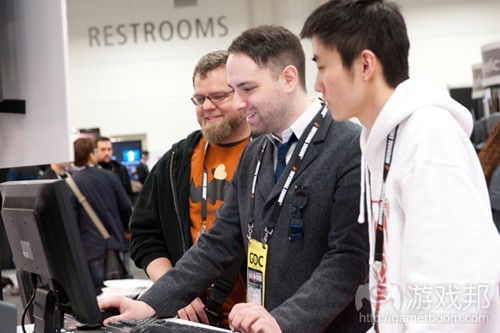
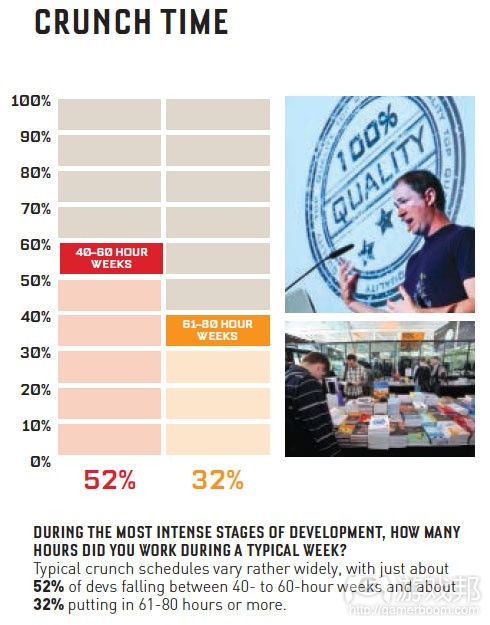

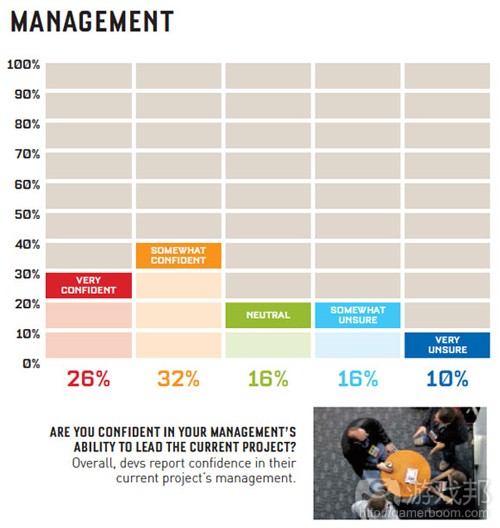
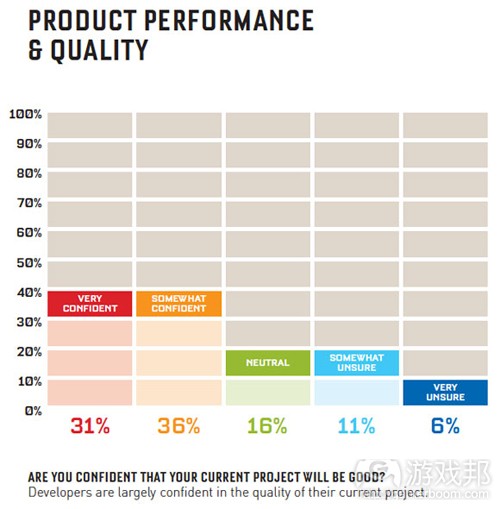
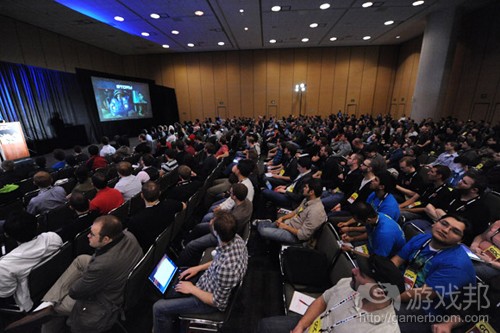














 闽公网安备35020302001549号
闽公网安备35020302001549号